Mon 9 Jun 2014
A Western Movie Review by Jonathan Lewis: WILL PENNY (1968).
Posted by Steve under Reviews , Western movies[22] Comments
WILL PENNY. Paramount Pictures, 1968. Charlton Heston, Joan Hackett, Donald Pleasence, Lee Majors, Bruce Dern, Ben Johnson, Slim Pickens, Anthony Zerbe, Jon Gries. Screenwriter-director: Tom Gries.
Will Penny is a Western drama starring Charlton Heston as an aging cowhand caught between the only life he knows, that of a rugged, itinerant cowboy, and the love of a beautiful woman who wants to settle down with him. While the movie is neither a work of cinematic excellence, nor one of the best Westerns ever made, it is perhaps one of Heston’s finest, and least “epic,†big screen performances. Even if you’re not particularly a Heston fan, it’s worth watching.
The film may not resemble a traditional Western in terms of narrative or structure but contra Roger Ebert, Will Penny is very much part of the Western genre. That said, the film is best understood as a character study set in the Old West and as a filmmaker’s attempt to portray the life and psychology of a cowhand as realistically as possible.
While there are several notable flaws that do detract from the overall project, the film does succeed in providing the viewer with a glimpse of a West that was far less glamorous, and far more lonesome, than in the vast majority of shoot-them-up B-Westerns.
The plot really isn’t all that complicated. (If you haven’t seen the film yet, you might want to skip down a few paragraphs to avoid spoilers.) In fact, the plot’s simplicity is what makes what otherwise has the feel of made-for-television movie work as a film.
Will Penny (Heston) is an aging, illiterate cowhand working jobs when and where he can find them. After finishing one job, Will Penny and his two friends, Blue (Lee Majors in a rather undistinguished early film role) and Dutchie (a vastly under-utilized Anthony Zerbe) look for future work.
Along the way, they get into a confrontation with Preacher Quint, a bearded, wild-eyed, Bible quoting, madman (a somewhat miscast, overacting Donald Pleasence) and his family of misfits, over an elk. Penny shoots and kills one of Quinn’s sons with a rifle. The grieving and crazed father retreats, announcing to the world that he’ll seek to avenge his son’s killing.
During the gun battle, Dutchie ends up shooting himself in the chest. The three men then travel in search of a doctor, encountering Catherine Allen (a lovely, classy Joan Hackett) and her son, Horace, (portrayed by Jon Gries, son of writer/director, Tom Gries) in a tavern along the way.
After a series of not particularly compelling events, Quint and his remaining sons catch up with Will Penny, gravely injuring him. Allen nurses Will Penny back to health and, as might be expected, she begins to fall in love with him.
Will Penny, for his part, is both attracted to and confused by, the domestic lifestyle she and Horace take for granted. He develops a particular fondness for the young Horace, becoming a father figure to him.
Preacher Quint eventually returns – yet again – and wreaks havoc on the Allen household. In a final showdown, Will Penny, along with Blue and Dutchie who appear oddly out of nowhere at the most opportune time imaginable, take on the Quint family, eventually killing the lunatic patriarch.
Allen’s feelings toward Will Penny are now perfectly clear. Despite the fact that she has a husband out in Oregon, she wants him to marry her. Her plan is for them to settle down together as homesteaders. Will Penny is mighty tempted by the idea, but he just doesn’t see it as a viable option. After all, he’s nearly 50, an old man for that time and place. The only life he’s ever known is that of an itinerant cowhand; he simply couldn’t imagine giving it all up for a life of domesticity.
There is no happily ever after. Despite Allen’s entreaties, Will Penny decides to ride off with Blue and Dutchie, leaving Allen and Horace behind him.
When discussing Will Penny, “authenticity,†seems to be the key word. Will Penny is a character study of a lonesome, somewhat taciturn cowhand. He is not only illiterate, but he’s embarrassed by it. He prefers not to fight with his hands, as those are, in his estimation, hands are designed for working, not fighting. Instead, he makes use of a skillet in one fight and of his legs in others. The whiskey he drinks burns his throat. Most of all, Will Penny is extraordinarily, painfully, awkward around women.
But is the film, as writer/director Tom Gries intended, a realistic portrayal of a cowboy? I guess that depends. The Old West was a large place geographically and hosted a wide array of characters, good and bad, normal and strange, ebullient and bashful. Will Penny does, however, succeed in avoiding the obviously embellished features that mar other portrayals of cowboys, turning them into larger than life figures.
Heston’s Will Penny isn’t perfectly clean, well-spoken or comfortable in society. He also doesn’t like killing men much, either. He’s no romantic hero. He’s just a regular guy who comes to realize that the true villain in his life wasn’t Preacher Quint, but rather time and circumstance.
Will Penny may not be a great Western, but it’s a good one, a film that you’ll probably want to think about for a while before you form your own opinion on whether it works or not.
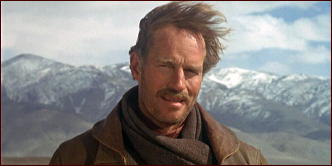
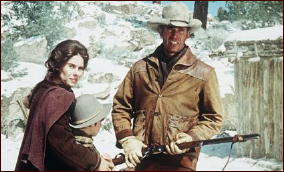
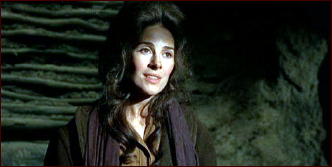
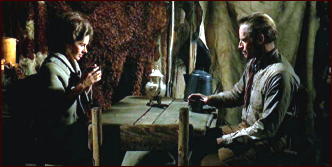

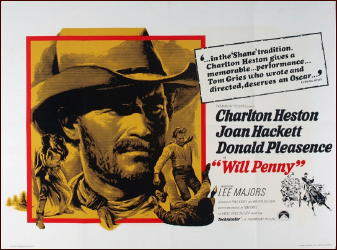
June 9th, 2014 at 1:56 pm
It’s a very good film. It IS a western, like you say, but it comes at the end of the 60s, when the traditional Hollywood western was beginning to die out. It is one of Heston’s most low key, unshowy roles. He tended to play the Great Man by this point in his career, and it’s fascinating to see him inhabit this shy, illiterate nobody. It’s a very good cast (even Pleasence, whom one expects to be rather over the top) and the film is quite touching in a way that stays with you some time after the end of the film. It’s not cynical, in a way that some revisionist western movies were at the time, but it is quite believable. His decision is a desperately sad one, but you can believe that this tragic, emotionally stunted man would make it.
June 9th, 2014 at 3:19 pm
Jon and I watched this movie together last week, and I agree with both his assessment and yours, Bradstreet. I think it’s a marvelous film. I even enjoyed Pleasence’s performance, knowing full well it wasn’t going to be to everyone’s taste. I thought I might have seen the movie when it first came out, but as I sat there watching, nothing came back to me, so obviously I hadn’t. Having grown up watching B-westerns in the local theater every Saturday afternoon, I was probably burnt out on western watching, and I never did catch on to revisionist ones until much, much later — not until maybe 4 or 5 years ago, when I could see them on DVD.
June 9th, 2014 at 3:51 pm
It took me a while to determine what I thought of Pleasence’s performance in this film. (I’m actually an admirer of his work and think his roles in the 1950s BBC version of “1984” directed by Nigel Kneale and in John Carpenter’s “Halloween” are outstanding and are among his best).
I liked him as Quint in the beginning, when we first encounter him and his caravan of outcasts. I thought he portrayed the type of wild eyed misfit that roamed the Old West. He also has an accent of some sort — couldn’t place it — that demonstrates how multi-lingual and multicultural the West was (same with Dutchie, but I digress).
What I didn’t like about his performance was that I thought the further we got into the film, the more he was overacting as to show how crazed Quint was supposed to be. In many ways, I don’t blame Pleasence. I got the sense that this was more of a director issue. For example, there’s a scene in which he is dancing in the Allen household while his sons hold Will Penny hostage. Just seemed forced to me.
June 9th, 2014 at 4:26 pm
Tom Gries did some smart interesting westerns in this era and this is probably the best of them, and, with Monte Walsh and Delmer Davies The Cowboy’s the closest to the reality of the era.
There were never more than 10,000 cowboys in the true old west, and most estimates are that 7,000 of them were black. Like Will Penny, most cowboys were drifters who didn’t own a horse, a gun, and sometimes not their own saddle. Many of them worked a season or two in exchange for food, tobacco, and eventually a horse, and they tended to drift from job to job, ranch to ranch from Texas up into Montana.
As you can imagine alcoholism was common as was tuberculosis, venereal disease, crippling arthritis at a fairly young age, and major dental problems. Maybe that’s why most cowboy songs are so sad.
Within the confines of Hollywood this is fairly accurate, though ironically it was actual cowboys and westerners like Tom Mix and Tim McCoy who created many of the tropes of the B western.
Most cowboys couldn’t hit the broadside of a barn at two feet with a handgun. Most gunfights happened at three feet away and no one hit anyone. They were seldom fast, and their hands often so busted up they could barely use a handgun.
Technically this film is a tragedy, Will Penny does not overcome his deepest flaws, but falls back on the world he is comfortable with. For all his courage he proves a coward emotionally unable to grasp the dream that would free him. In that it is sadly realistic about cowboys in general.
They are all a bit too old too in this and the other films I mention. Cowboys in general tended to be much younger than this as the work busted a man up pretty bad and the years of good work you could get out of a cowboy were short. That is still true today, every cowboy I’ve known being pretty broken inside. The pay is better, and most plan to become ranchers and not stay cowboys, but it is still hard dangerous mind, soul, and butt numbing work.
Spending a day in the saddle of a spiny skinny quarter horse cowpony while roping, swearing, kicking, sweating, bleeding, blistering, branding, being stepped on, kicked, and gored by cattle is no more glamorous now than then. I loved doing it, but at the end of the day I could leave my grandfather’s ranch, and go home to a nice soft bed, color television, and a week of high school. There is something I can’t quite explain about it that is addictive, but then those of us who have done it don’t tend to be in our right minds on the subject. That was true then too.
June 9th, 2014 at 4:32 pm
David,
All very interesting. Thank you.
As far as black cowboys, this is an interesting story:
http://www.cnn.com/2012/11/15/world/black-cowboys/
Someone should make a film about this subject. Would be worthwhile, although you’d need a couple of major names in the cast for people to go see it
June 9th, 2014 at 4:33 pm
A feature film, rather than a documentary, I should add
June 9th, 2014 at 4:52 pm
Bradstreet,
Your comment re the 60’s and the tail end of the the traditional western is well observed, but I don’t think you went far enough with it. It was this kind of thinking that ended virtually all westerns, and certainly ‘the western’ as a stand alone genre.
June 9th, 2014 at 5:35 pm
Chunks of this were borrowed from an episode of THE WESTERNER that Gries wrote and directed back in 1960. I saw this at a local grind house (the only theater showing it in this town) and liked it quite a lot. My only problem with it was that I subsequently wasted a lot of my precious youth waiting for Tom Gries to do something nearly as good.
June 9th, 2014 at 6:44 pm
Barry: One of the things that tells you that a genre is dying out is when ‘the rules’ that govern it began to be ignored. Rather than being ‘westerns’ they tend to be films set during that era. It’s sounds like the same thing, but really isn’t. Attempting to list these rules would be difficult, but you know when they are being broken. John Wayne’s last films tended to try and doggedly stick to the rules, whilst being forced to update in various different ways (BIG JAKE was far more violent than his previous westerns). You could make a case for saying THE SHOOTIST is not only the last Wayne movie, but also the last traditional western. After that, any major Hollywood western was comedy, fantasy or some other genre.
Jonathan: Have you ever seen Pleasance’s performance as the sarcastic Scotland Yard detective in DEATHLINE (the one about cannibals living in the London Underground)? He takes what would have been a supporting role in someone else’s hands and walks away with the film.
June 9th, 2014 at 6:51 pm
Bradstreet,
That makes sense.
June 9th, 2014 at 9:53 pm
I have not seen “Deathline.” Will check it out.
Recommendations of other films of note that star or co-star Donald Pleasence welcome.
June 10th, 2014 at 6:21 am
I haven’t seen this in decades but liked it a lot the first time I saw it, when it first came out. Heston was much more understated than he usually was at that point in his career, and Hackett was wonderful as usual.
As for Pleasence, the first thing I remember seeing him in was THE GREAT ESCAPE. He played Ernst Stavro Blofeld in YOUR ONLY LIVE TWICE, the first time the character was seen on screen in a James Bond movie.
June 10th, 2014 at 7:35 am
“Recommendations of other films of note that star or co-star Donald Pleasence welcome”.
Pleasence starred in an excellent “Outer Limits” episode “The Man with the Power” (1963).
He appeared in other films I like – but don’t always remember his performances in these films, or whether he had memorable or big roles:
Fantastic Voyage (Richard Fleischer, 1966)
The Black Windmill (Don Siegel, 1974)
Ground Zero (Michael Pattinson, Bruce Miles, 1987). An Australian film that should be better known.
Three British TV works that stand out in Pleasence’s filmography, that I have never seen:
The Horse of the Invisible (Alan Cooke, 1971) Based on a famous, classic mystery short story by William Hope Hodgson. Pleasence plays Hodgson’s detective Carnacki. Part of the “The Rivals of Sherlock Holmes” TV series.
Ubu Roi (Paul Kafno, 1976). Film of Alfred Jarry’s extremely odd avant-garde play. The mind reels. What would this be like?
The Ghost Sonata (Philip Saville, 1980) Another famous avant-garde play, this one by Sweden’s August Strindberg. One of the key works in the evolution of experimental theater.
June 10th, 2014 at 10:11 am
Thanks Mike.
Will be looking for these and more
June 10th, 2014 at 12:06 pm
Jeff: I agree. Hackett was wonderful in this. Can’t quite pin down what her accent is supposed to be. Supposedly her character was from Ohio.
Dan: I remember reading that about Gries and the episode of “The Westerner”. I was debating mentioning it in my review, but for some reason chose not to. I’m glad you mentioned it, as it is important. I think Gries went on to direct a Charles Manson biopic, Helter Skelter in the late 70s. Never saw it and frankly don’t have much interest in that topic
June 10th, 2014 at 3:09 pm
Another Pleasance performance that I would recommend is in BEYOND THE GRAVE. It’s one of those portmanteau horror movies from the early 70s. He appears with his daughter Angela (playing his character’s daughter) in a story called AN ACT OF KINDNESS. It’s a very effective performance, in that it is funny and yet unsettling at the same time.
June 10th, 2014 at 5:38 pm
For a truly different Donald Pleasance see him as the drunker mountain man seer Oracle in The Hallelujah Trail. He. Martin Landau as a medicine man, and Brian Keith steal the film and have all the funniest scenes. But you won’t have see Pleasance in anything like this.
I always wanted to see him play Iago from Othello, it seems almost written for a Donald Pleasance type actor.
Bradstreet
While some good westerns were made afterward, I didn’t entirely disagree with Brian Garfield’s remark that they should have stopped making westerns altogether when Gary Cooper died. From 1960 on they seemed to struggle with the form doing best when they stepped out of the classic form.
Gries never did make it quite big enough to find out if he was an auteur or not, maybe if he had been able to start when Bottecher did he would have made some better films.
June 10th, 2014 at 5:59 pm
Budd Boetticher is an auteur rather than simply a competent technician for numerous reasons: Burt Kennedy, Harry Joe Brown and Randolph Scott. Without those men providing a framework within which he could succeed, only product remains. Tom Gries did not have a comparable relationship. Few did.
October 12th, 2020 at 5:21 pm
[…] who had appeared with Charlton Heston in Tom Gries’s excellent Will Penny (1967) which I reviewed here are just as effective as his first scene in which he taunts Johnny’s Mexican friend before […]
April 9th, 2024 at 3:09 am
Don´t think more about it! Will Penny is an amazing western in all his categories. Here, in my country, Spain, Gries have a large bunch of people, filmgoers you call in USA, devoted of this masterpiece. Gries and his career needs a revision of all his work… Maybey is not a genius filmaker, but, like Penny, it know very well is job.
March 17th, 2025 at 6:37 am
Will Penny is one of his best movies, and I would say it is his best performance
Usually he is playing Charlton Heston.
Here, the character comes through.
Maybe it’s the mustache.☺
See also Gregory Peck in The Gunfighter.
April 17th, 2025 at 8:46 pm
[…] unconventional, to be sure. It reminded me in some ways of Will Penny (1968) which I reviewed here years ago. That’s high […]